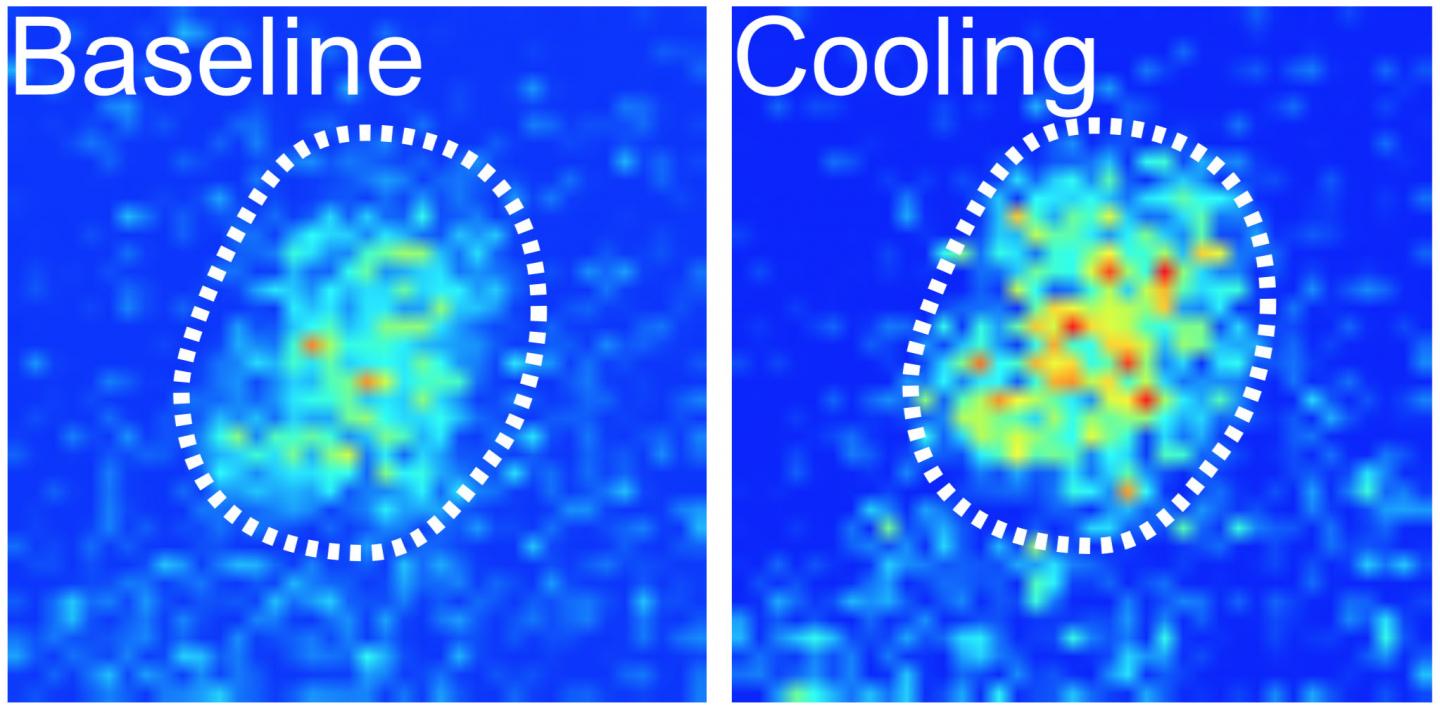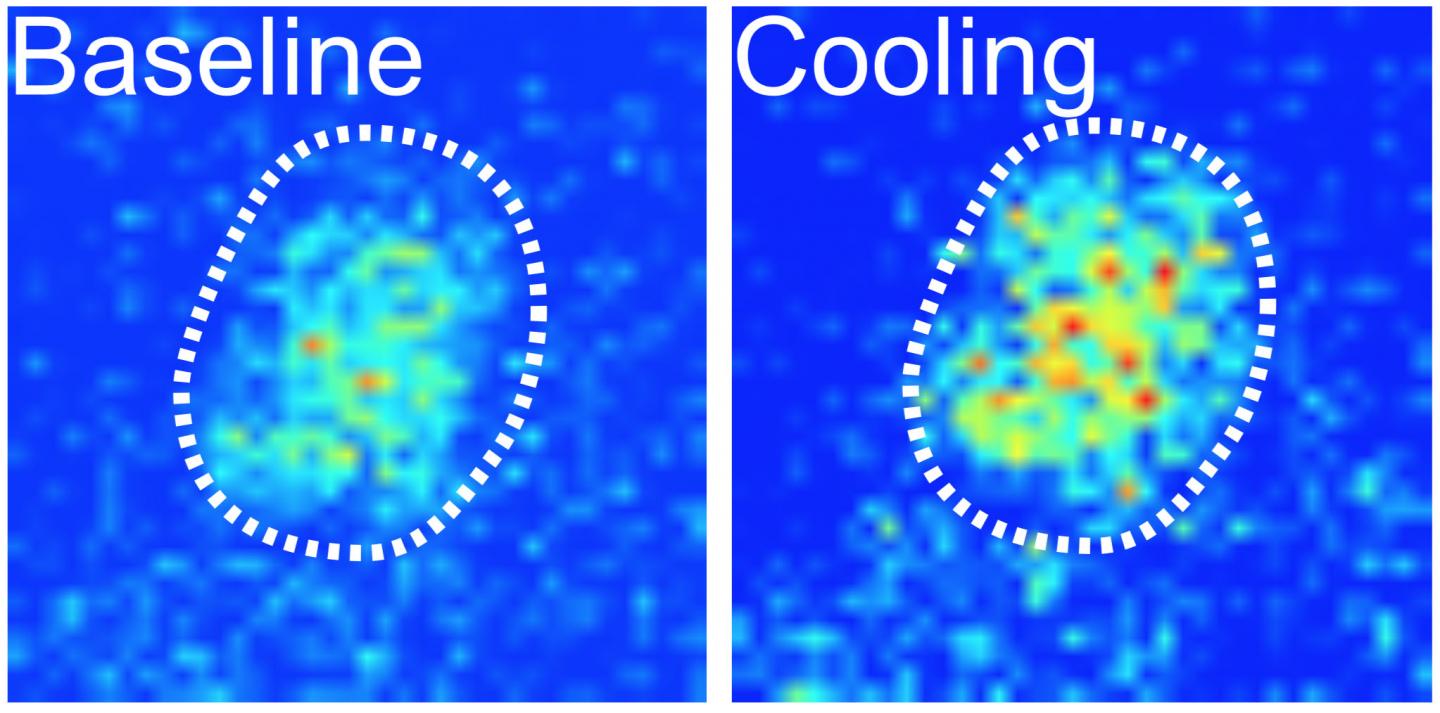
Credit: Shafer lab, University of Michigan, Ann Arbor
Circuits in the brain act as an internal clock to tell us it is time to sleep and to control how long we then stay asleep. A new study in flies suggests a part of that clock constantly monitors changes in external temperature and integrates that information into the neural network controlling sleep. The study was published in Nature and was supported by the National Institute of Neurological Disorders and Stroke (NINDS), a part of the National Institutes of Health.
"This study takes advantage of the powerful model system of the fly's circadian clock network to demonstrate how temperature cues from the environment are used to control the time and duration of sleep," said Janet He, Ph.D., program director, NINDS.
The circadian clock is a fundamental process found in nearly every living organism that coordinates sleep behavior with changes in the environment. The link between the light/dark cycle and the onset of sleep is well recognized; however, changes in temperature also appear to affect sleep patterns in humans.
"The clock discovered in flies more than 30 years ago is essentially the same one found in the human brain," said Orie Shafer, Ph.D., associate professor at the University of Michigan, Ann Arbor, and senior author of this study. "Circadian clock studies are beautiful examples of how the fly has important things to tell us about how our bodies work."
By using a special fluorescent protein that changes from green to red when neurons fire, Dr. Shafer and his team watched the activity of different parts of the fly brain's circadian clock while they increased or decreased the surrounding temperature. To their surprise, an area in the fly brain's circadian clock called the DN1p increased its activity when cooled and became less active when heated.
"We knew that light excites the circadian clock overall and that light and heat typically increase at the same time, so it was completely unexpected to find a region of the clock that increased its activity in response to cooling," said Dr. Shafer.
As experienced by anyone who has traveled across time zones, the circadian clock can be "reset" over time in response to new day/light cycles. The clock of flies can be retrained to new cycles of either light or temperature, so Dr. Shafer and his colleagues next looked at whether the DN1p is involved in resetting the clock to a new heating/cooling cycle.
Because DN1p neurons are thought to be sleep-promoting, the researchers blocked their activity or eliminated them genetically. Both affected the flies' ability to retrain their sleep cycle in response to changes in temperature, highlighting the importance of the DN1p for the control of sleep behavior.
"Because flies' bodies are translucent, their clock neurons can respond to light directly," said Dr. Shafer. "We next asked whether temperature worked in the same way or required external organs."
In flies, temperature could be sensed directly by neurons in the brain or via nerve impulses from sensory organs in the body. To distinguish between the two, the investigators genetically manipulated or physically removed the sensory organs and found that the DN1p neurons no longer responded to changes in temperature. This meant that the clock interprets temperature signals from the body rather than sensing temperature changes directly.
The circadian clock of larger animals and humans is also sensitive to changes in temperature, and because of their larger size, would require input from external sensory organs. The fact that, despite its small size, the fly clock also relies on temperature sensors outside the brain suggests that the findings of this study could have broad implications in the control of sleep in humans.
###
Funding for this study was provided by NINDS (NS077933), National Science Foundation, and the Damon Runyon Cancer Foundation.
Reference
Yadlapalli et al. Circadian clock neurons constantly monitor environmental temperature to set sleep timing. Nature. February 21, 2018. doi: 10.1038/nature25740
For more information: https://www.ninds.nih.gov/Disorders/Patient-Caregiver-Education/Understanding-Sleep
https://www.ninds.nih.gov
The NINDS is the nation's leading funder of research on the brain and nervous system. The mission of NINDS is to seek fundamental knowledge about the brain and nervous system and to use that knowledge to reduce the burden of neurological disease.
About the National Institutes of Health (NIH): NIH, the nation's medical research agency, includes 27 Institutes and Centers and is a component of the U.S. Department of Health and Human Services. NIH is the primary federal agency conducting and supporting basic, clinical, and translational medical research, and is investigating the causes, treatments, and cures for both common and rare diseases. For more information about NIH and its programs, visit http://www.nih.gov.
Media Contact
Carl Wonders
[email protected]
301-435-7757
@NINDSnews
http://www.ninds.nih.gov
Original Source
https://www.ninds.nih.gov/News-Events/News-and-Press-Releases/Press-Releases/brains-internal-clock-continually-takes-its http://dx.doi.org/10.1038/nature25740





